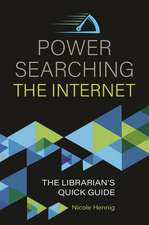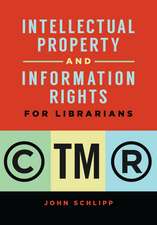Collection Management Basics: Library and Information Science Text (Hardcover)
Autor G. Edward Evans, Margaret Zarnosky Saponaroen Limba Engleză Hardback – 30 apr 2012
The well-established gold standard in texts on collection development, "Collection Management Basics: Sixth Edition" provides a new edition to the last "Developing Library and Information Center Collections" book providing a completely fresh approach to the material.
This latest edition continues to cover all aspects of collection development and management, including subjects such as needs assessment, policies, selection process theory and practice, protection, legal issues, censorship, and intellectual freedom. The book represents a total restructuring of the previous work, and reflects changes brought on by new technology and the up-and-down economy. Students and practitioners alike will benefit greatly from this up-to-date and essential text.
Preț: 523.35 lei
Nou
100.14€ • 109.12$ • 84.39£
Carte indisponibilă temporar
Specificații
ISBN-10: 1598848631
Pagini: 343
Ilustrații: 15
Dimensiuni: 180 x 257 x 28 mm
Greutate: 0.91 kg
Ediția:Revizuită
Editura: LIBRARIES UNLIMITED
Seria Library and Information Science Text (Hardcover)
Descriere
This latest edition continues to cover all aspects of collection development and management, including subjects such as needs assessment, policies, selection process theory and practice, protection, legal issues, censorship, and intellectual freedom. The book represents a total restructuring of the previous work, and reflects changes brought on by new technology and the up-and-down economy. Students and practitioners alike will benefit greatly from this up-to-date and essential text.




